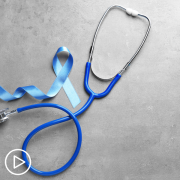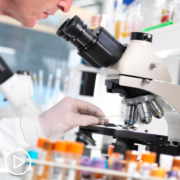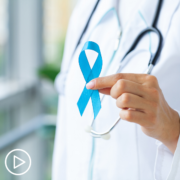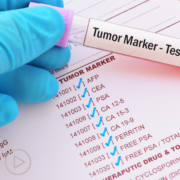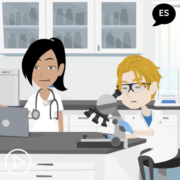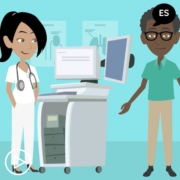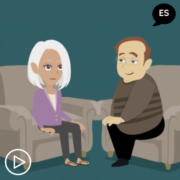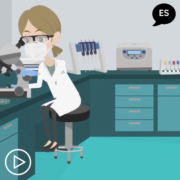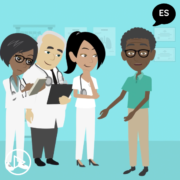PODCAST: Thriving With Prostate Cancer | Tools for Navigating Care and Treatment
How can you thrive with prostate cancer? Dr. Tanya Dorff discusses prostate cancer treatment and developing research, side effect and symptom management, and shares advice and resources for coping with emotional issues.
About the Guest:
Dr. Tanya Dorff is Associate Professor in the Department of Medical Oncology & Therapeutics Research at City of Hope.
See More from the Empowered! Podcast
Transcript:
Katherine:
Hello and welcome. I’m Katherine Banwell, your host for today’s program. Today’s webinar is part of our Thrive series, and we’re going to discuss tools to help you navigate life with prostate cancer. Before we meet our guest, let’s review a few important details. The reminder email you’ve received about this program contains a link to a program resource guide. If you haven’t already, click that link to access information to follow along during the webinar.
At the end of this program, you’ll receive a link to a survey. Please take a moment to provide feedback about your experience today in order to help us plan future webinars. And finally, before we get into the discussion, please remember that this program is not a substitute for seeking medical advice. Please refer to your healthcare team about what might be best for you.
Well, let’s meet our guest today. Joining me is Dr. Tanya Dorff. Dr. Dorff, welcome. Would you please introduce yourself?
Dr. Dorff:
Thank you. Hi, I’m Tanya Dorff. I’m a medical oncologist and section chief of the genitourinary cancer program at City of Hope, which is near Los Angeles, California.
Katherine:
Excellent. Thank you so much for taking the time to join us today.
Dr. Dorff:
My pleasure.
Katherine:
Like all of the webinars in our Thrive series, we start with the same question. In your experience, what do you think it means to thrive with prostate cancer?
Dr. Dorff:
Well, that’s a big question. As a medical oncologist, my job is to try to strike a balance between cancer control and quality of life, and I guess that’s how I would put thriving with prostate cancer. It’s not always just about what is the PSA doing, but it’s also about, ‘How are you getting around your day-to-day life activities, and are you able to do the things you enjoy?’ So, treatments can be very effective. They can also have significant side effects, and we spend a lot of time day in and day out trying to help men strike a good balance.
Katherine:
Thank you for that, Dr. Dorff. Let’s move on to how prostate cancer is treated. This webinar is mainly focused on advanced prostate cancer. But before we get into treatments for more advanced disease, let’s do a quick overview of early-stage prostate cancer options. First, some prostate cancer patients are often put in active surveillance. What does that mean?
Dr. Dorff:
Active surveillance is different than what some people think it is. So, some people think it means we’re not going to treat the cancer, that we’re just going to let it take its natural course. It’s actually quite active, as the name implies. We’re really trying to get to know a person’s cancer and understand whether it is a cancer that will ultimately need to be treated, in which case we will intervene with definitive treatment, whether that be radiation or surgery, but the goal is to find those patients whose cancer is not very aggressive and may never need to be treated so that they can avoid the possible risks that come from definitive local therapy.
Katherine:
So it’s more like a watch-and-wait situation?
Dr. Dorff:
But it’s…I, again, view it as a little bit different than that. Watch and wait is “let’s just let it do what it’s going to do.” Active surveillance is what I call a getting-to-know-you period. Let’s understand whether these clinical features that have signaled that your cancer may be low-risk, may not need treatment – let’s see if that really plays out, let’s make sure we haven’t missed anything, and if your cancer needs treatment, we’re going to treat it.
Katherine:
Okay, that’s good to know, thank you. When it is time to start treatment, what types of approaches are available for early-stage prostate cancer patients?
Dr. Dorff:
Localized prostate cancer or early-stage prostate cancer can be cured with either surgery or radiation, and we actually view these to be equally effective options. Sometimes people have the misconception that if they’re getting radiation to treat their localized prostate cancer, they’re being relegated to a noncurative or a less effective option. It’s actually not the case. We don’t have truly good, randomized, head-to-head studies.
You can find retrospective studies, people looking back at 2,000 patients treated at this institution or that institution, and you can find a study that pretty much says whatever you want it to. You can find some that say surgery’s better, some that say radiation’s better, but in sum, we sort of view them as being equally effective options. And so, they just have different side effect profiles, and so, we often counsel patients who are considering which local treatment to receive to look at what their current urinary function is, what their goals are for their long-term function, both urinary and sexual, and use that as a guide, as well as their age, their other health conditions, and those kinds of factors.
Katherine:
Let’s turn now to how advanced prostate cancer is treated. First, what does it mean to have advanced disease?
Dr. Dorff:
Advanced prostate cancer signals cancer that’s come back after curative intention or has presented de novo in a way that means we don’t currently have a tool to cure it. That’s at least how I view advanced prostate cancer. You could take a broader definition and consider some high-risk localized patients who need multimodal therapy, but to me, it’s really signaling a shift from something we’re aiming to cure versus something we’re aiming to manage, so that can manifest just as a PSA that’s rising, what we call biochemical recurrence, or it can manifest as visible metastatic disease.
Katherine:
What does “locally advanced” mean?
Dr. Dorff:
So, “locally advanced” means that it hasn’t metastasized, but it might be involving the local structures, like the seminal vesicles or the bladder or some of the regional lymph nodes, the pelvic lymph nodes.
Katherine:
How is advanced prostate cancer treated?
Dr. Dorff:
The cornerstone of treatment for advanced prostate cancer has really been hormone therapy. I think there’s a lot of negative stuff out there on the internet about hormone therapy that I think does a disservice to patients because hormone therapy is truly very, very effective and, for many men, can be quite livable.
I have patients who live more than a decade on hormone therapy, and they’re running their businesses and they’re raising their grandkids, they’re traveling, they’re running 10Ks, they’re doing all the things that they might want to be doing. That’s not to say there aren’t side effects, but hormone therapy is an effective cornerstone, and I really hope people won’t dismiss it offhand because of the negative things they’ve heard or read about it.
Katherine:
What about other treatment classes?
Dr. Dorff:
Most of our other treatments are really layered on top of hormone therapy. We may get to a point – 10 years from now, I don’t know, sometime in the future – when we don’t start with the hormone therapy, so a lot of patients come in asking about the new radiopharmaceutical, the Lutetium-177-PSMA that got approved last year, or about whether chemotherapy can be used. They can be, but they’re really layered on top of hormone therapy, so the hormone therapy is the first treatment, it’s the most effective right now, and then it’s continued as we swap out – we add a novel hormonal agent like abiraterone (Zytiga), or enzalutamide (Xtandi), or one of the others.
When that is no longer effective, we swap that out, we might use chemotherapy or the radiopharmaceutical. There’s also an immunotherapy that’s been around for more than a decade called sipuleucel-T, and now there’s the targeted therapies – the PARP inhibitors – as well for select patients.
Katherine:
Where do clinical trials fit into treatment?
Dr. Dorff:
That’s a great question. I’m so glad you asked. Clinical trials some people mistakenly believe are your last choice, like you’ve gone through every single treatment we have, and then you go to a clinical trial. That’s not the case. Some of the biggest advances in prostate cancer have been when we’ve taken drugs that work in a more advanced resistance setting, like a second- or third-line, and when we move them right up front, first-line, we dramatically amplify their benefit. We dramatically improve survival.
So, if we don’t think about a clinical trial in the first line, we’re going to miss the opportunity to not only develop those new treatment paradigms, but actually participate in them ahead of when they become the new standard of care down the road.
Another misconception that people have often about clinical trials is that they are always randomized, there’s always a flipping of the coin in assignment of different treatments, and that they may include a placebo. So, most of our clinical trials at this point do not include placebo. Because we have so many effective treatment options, we’re more and more frequently comparing either two drugs against one, so everyone’s getting at least one effective drug, or we’re not comparing at all, but everyone’s getting some new treatment or some combination of treatments when we’re working out dosing in that scenario, like a Phase II.
So, clinical trials are really an option at any stage of prostate cancer, even at diagnosis for localized disease all the way through, and truly, I hope people would consider looking at those as options because that’s where some of the most innovative treatment options are going to become available to them.
Katherine:
Yeah. What sorts of questions should patients ask their doctors about clinical trials?
Dr. Dorff:
There are a few really basic things to ask about any clinical trial that you’re being presented as an option. One is is there a randomization? Is there a treatment assignment where some people get one treatment and some people get another treatment? Another one is is there a placebo? I think if we just get those questions up front, right away, then people may be more open to hearing what’s happening in the rest of the trial.
Our informed consent documents are reviewed by ethical consultants and are really meant to inform about risks more than benefits, so the other thing to really ask the provider is what’s the goal of the trial, because that’s often not clearly communicated in an informed consent. Why did the people who designed this trial think it was a good idea? Is there science behind it, is there clinical data behind it, and do you think this is something that, in the future, could end up being the new way that prostate cancer is treated?
What is it about me that you think makes me a good candidate for this trial? What’s been your experience? – even though it’s more anecdotal, but it’s often nice to hear from a physician “I have patients on this trial, they’re having these types of side effects, they’re having these types of benefits, and we can’t know what will happen for you, but at least I have a sense of how things are going on this trial.”
Katherine:
Yeah, those are great questions. What about cost? Is that a question that patients should ask about?
Dr. Dorff:
Patients often do ask about that. Costs are really complex in this medical care landscape that we have in the United States. Clinical trials – I think there’s a lot of misunderstanding about costs. Some people think that everything is paid for by the clinical trial, which is not true.
There is a system by which we assign things that will be paid for by the clinical trial – anything that’s novel and only being done as part of the trial versus things that would be done anyway if you were not in the trial and if you were just receiving regular care, such as your PSA test, your clinic visit, your CAT scan potential, or your bone scan.
So, there are some costs that are not covered, and in that case, if a patient has an insurance plan where they have copays for a clinic visit or for a CAT scan, those aspects that are not felt to be unique to the clinical trial and are getting billed to standard insurance – that means they’re still going to have those copays, but anything that is unique, if there’s an extra set of scans, if there are extra clinic visits, those get billed to the study, and the patient should have no extra cost on that basis.
Insurance companies should view clinical trials very favorably, because they’re often getting some clinical care paid for. They’re getting extra treatment at no cost, so anything that’s new on the treatment plan in the clinical trial is free to the insurance company on the patient, it’s paid for by the study, so it’s a good deal, generally speaking, and more importantly, there’s legislation that really seeks to ensure that regardless of your insurance, you should have access to clinical trials because they are felt to be often the best way to have your cancer treated.
Katherine:
Yeah. Dr. Dorff, are there emerging therapies that are showing promise?
Dr. Dorff:
There are a lot of emerging therapies. People all over the country and all over the world are working to find new and better ways to treat prostate cancer. So, the breakthrough radiopharmaceutical last year of the Leutetium-177-PSMA is the first, but not the last, I believe, in that field. There are other antigens we can target rather than PSMA, there are other particles we can use rather then Lutetium-177, and so, there are currently clinical trials looking at different constructs.
Take a winning strategy, and then tweak it a little bit to see if you can make it even better, right? Similarly, the PARP inhibitors, which are FDA-approved for prostate cancer, are being studied in different types of clinical trials to try to expand the number of patients who can benefit from them and amplify the benefit – so, moving them earlier, increasing the types of patients who are appropriate.
And there are additional targeted therapies, like the PI3-kinase AKT inhibitors, the CDK-46 inhibitors, that are being looked at in combination with our standard hormonal drugs that I think could end up being big advances depending how the results play out. There’s a novel class of drugs, the antigen receptor degraders, which also look tremendously promising in clinical trials and are in Phase III testing in some cases, and then, some additional ones are a little earlier in testing.
And then, there’s immunotherapy, which is at the heart of my research at City of Hope. Immunotherapy offers the promise of using your own immune system to control the cancer or eradicate the cancer, so we’re looking at different strategies, from oncolytic viruses, to bi-specific T-cell-engaging antibodies, to CAR-T cell therapies in hopes that we will find something that can really induce a big, deep, durable, long-lasting remission for patients.
Katherine:
That’s really promising. What about treating symptoms of the disease itself, like bone pain?
Dr. Dorff:
Bone metastases are the predominant pattern of spread, and so, what really drives the story for a lot of our prostate cancer patients during their journey with cancer has to do with bone complications – not always pain, but unfortunately, there can be pain pretty frequently.
So, we start by trying to protect the bones early on. We know that when we use our hormonal therapies, osteoporosis can develop, so we want to avoid that. I’ve had patients where their cancer was well-controlled, but they had an osteoporosis fracture that they were miserable from, so it starts at the beginning, at protecting the bones, checking a bone density scan and/or using a bone-supportive agent like zoledronic acid (Zometa) or denosumab (Xgeva), and then, in the metastatic setting, as the disease progresses, we intensify that use of bone-supportive agents.
We sometimes end up using radiation therapy, which is primarily external-beam traditional kind of radiation, but there is also the radiopharmaceutical Radium-223 (Xofigo), which delivers the radiation kind of more internally through the bloodstream to areas of the bone that are active from the prostate cancer, and sometimes we end up needing something even like surgery, but the bones are a major part of the story.
Katherine:
Yeah. What about sexual dysfunction? Are there approaches that can help?
Dr. Dorff:
So, this is generally an area that’s managed more by urology. There definitely are things that urologists do to help patients who have lost sexual function due to prostate cancer treatments. They can involve medicines, they can involve slightly more invasive things like a suppository or an intracavernosal injection. There are also more mechanical ways, like a pump device or a penile implant, but generally, anything beyond the first level, which is Viagra, will be handled more by a urologist than a medical oncologist.
Katherine:
What is palliative care, and how can it help men with prostate cancer?
Dr. Dorff:
Palliative care is something that we think about more towards the end of life, where we’re focusing on cancer symptoms more than treating cancer. However, some studies have shown – very prominent studies – that early palliative care in some malignancies is associated actually with better survival, meaning that paying attention to the patient’s symptoms is actually a really important part of keeping them well and keeping them alive as we treat the cancer.
So, more and more, we’re starting to integrate palliative care earlier in the disease.
I think that can sometimes signal a little alarm for patients – “Oh, I’m being referred to palliative care, that means my doctor doesn’t really think they can treat my cancer anymore” – and it’s gonna take some education to really help people transform their thinking about palliative care as a strategy that’s not for the end, but something that really should be part of our treatment all along.
So, our palliative care team, or what we call supportive medicine at City of Hope, uses treatments to manage pain. They have a broader spectrum, they’re more focused on all the different modalities to treat pain, so an oncologist or urologist can treat pain, but when we refer to palliative or supportive medicine, you get just that extra expertise, especially if people are having a lot of side effects from pain medicines, but our supportive medicine doctors aren’t only pain management doctors.
They help with other symptoms, like nausea or constipation, to some extent urinary symptoms for my prostate cancer patients, although we rely heavily on urology for that, and also just the existential, or spiritual, or emotional components.
Our supportive medicine team typically includes not only an MD, an advanced practice provider like an NP, but also someone from psychology, someone from social work, because dealing with cancer is really stressful and challenging, and in an ideal world, palliative care is not only taking care of the symptoms of the cancer that are physical, but also helping the whole being, the whole family unit that’s going through this experience have less emotional distress as well.
Katherine:
Yeah. Well, that leads us perfectly into the next section, which is about emotional support. Beyond treatment, another large part of thriving with prostate cancer is dealing with the emotions that come along with the diagnosis, like fear and anxiety. Whether it’s the stress of being in active surveillance or worrying about progression, many patients need help coping emotionally. Why do you feel it’s so important for patients to share these emotions with their doctor or their healthcare team?
Dr. Dorff:
I think it’s a conversation that’s not held enough between patients and their physicians, and if we don’t remember to ask our patients, we will just focus on the medical because that’s our main wheelhouse, that’s what we’re best at. So, if a patient brings forth that they’re having some emotions related to the cancer, it is helpful to us in remembering – we ought to do everything 100 percent all of the time, but let’s face it, we’re physicians with time pressures and certain areas of comfort and expertise. So, if a patient brings it up, that is super helpful because then we know someone’s needing assistance, which probably every patient is, whether they tell us or not, but that triggers us to then offer appropriate referrals.
And also, it tells us they’re open to it. If we have to ask every patient, “Are you having any emotional distress?”, even if someone answers yes and then we make a referral, they may not have actually been ready for it or open to it. So, having the patient come forth and raise that, I think, is really helpful and important.
Katherine:
Many prostate cancer community members are interested in learning more about their cancer and are hungry for information. For men who are newly diagnosed, are there educational resources that you recommend?
Dr. Dorff:
There are several good patient-focused or patient-facing educational resources for cancers generally. So, the American Society of Clinical Oncology, or ASCO, runs a patient-facing website called Cancer.net.
They also produce a lot of educational materials. So, for instance, we have some handouts in our clinic rooms produced by ASCO that really just help patients understand, okay, when you’re having diarrhea related to cancer treatment, here are some strategies. So, there’s lots of good information from them. There’s also a group specific for prostate cancer called Prostate Cancer Foundation.
So, they are an organization that works a lot in funding new research in prostate cancer, but they also put out some really helpful publications, again, that are aimed at prostate cancer patients, and really kind of covering the whole spectrum of disease, as well as more holistic aspects which are really important, things like diet and exercise and how that plays into overall wellbeing and health during prostate cancer treatment. So, we keep some of those little booklets in our rooms as well to hand out to patients, but they’re probably available by request online as well on one of the Prostate Cancer Foundation websites.
Katherine:
Yeah. What about resources for prostate cancer patients who are already really knowledgeable about their disease and want to stay up to date on the latest research and treatment? What’s available for them?
Dr. Dorff:
There are some conferences that seek to educate patients on a little higher level. It can be challenging because not every prostate cancer patient is at the same place, but they can look for some of those conferences. Frankly, they can follow Twitter or some of the other social media.
Sometimes prostate cancer support groups also will bring in speakers who try to provide updates about emerging treatments, or where the research is going, or where the field is going. So, most big cancer centers are gonna have a support group.
Obviously, it’s very variable, and sometimes they may focus more on the psychosocial aspects, but I do think a lot of them will include people like me, who are just trying to connect with the cancer patients on various levels about the latest and greatest.
Katherine:
We received some audience questions prior to today’s webinar, and I’d like to go through some of them with you. Bob asks, “Does androgen deprivation therapy cause cognitive issues?”
Dr. Dorff:
So, androgen deprivation therapy is another way of saying hormone therapy. We’re lowering testosterone, which is an androgen, and the question about cognitive issues is a good one. If you look in the literature, it’s not been well documented, and part of that is because our patients tend to have age and other comorbidities that can lead to changes in cognition happening at the same time as they’re being treated for prostate cancer, but also because the tools just haven’t been very good.
The tests where we measure how your brain is working have traditionally not been very good. There are some better tools that have been developed, and we’re hoping to be able to – with some ongoing studies – better define are there cognitive changes? If so, how severe are they, how common are they, are they more common with one drug versus another? Very basic questions.
I will say in my own practice, after 15 years of treating prostate cancer, I do believe that some patients experience cognitive changes during ADT. They can be mild, like taking longer to remember someone’s name or walking into a room and forgetting why you’re there, which, frankly, happens to all of us when we’re not having our best days, but obviously, I do see that a little bit more with prostate cancer patients who are receiving hormonal therapy.
For some of my really high-functioning patients, it can be helpful to use a drug that treats attention because some of the cognitive dysfunction actually ends up being an issue with attention. So, we use drugs like methylphenidate (Ritalin) or dextroamphetamine mixed salts (Adderall) to support patients who need to be really focused, and I’ve had many patients tell me that that has made a huge difference for them, so it’s not going to solve the overall changes that may happen in the brain on the basis of the hormonal deprivation, which we know happens from animal models, but it can help in the short term so that men can continue to function at a high cognitive level, despite ADT, when needed.
Katherine:
Yeah. George wants to know, “Are there any advances in imaging that patients should know about?”
Dr. Dorff:
Yes. So, the PSMA PET scans – so, these are a nuclear medicine imaging that looks for prostate cancer using a protein called PSMA, and there are several of them, there’s the F-18-based one called Pylarify, and then there are the Gallium-68 versions, Illuccix and Locametz, so those have been revolutionary. They can see prostate cancer in much smaller quantities, so we use them a lot for rising PSA after prostate surgery or radiation to see where is his small amount of cancer, and hopefully, we can treat it better by seeing it earlier.
They are also now being used to select patients for potential benefit from a treatment like Lutetium-177-PSMA, which obviously won’t work if the cancer doesn’t have that protein, so the imaging helps see who’s got the protein, who can benefit from the treatment. So, that’s the biggest imaging advance. There are some others, like using MRI fused to ultrasound for prostate biopsy at diagnosis. There’s also another kind of PET scan called a fluciclovine PET scan, which we still sometimes use because not 100 percent of prostate cancers have PSMAs, so sometimes we need something a little bit different.
Katherine:
Antonio had this question. “I heard that statins – cholesterol-lowering drugs – could help fight prostate cancer. Is that true?”
Dr. Dorff:
There’s been a lot of interest in the statins because in addition to having those positive effects against cholesterol, which are helpful when hormonal therapy that we use for prostate cancer disrupts our lipids, they have these anti-inflammatory properties that are being looked at in a number of different research avenues.
And then, there has also been a new, evolving understanding that they interfere with some hormone-binding compounds in the body, and so, could augment the effect of androgen deprivation therapy.
So, there has been interest in prospective studies because the literature we have right now is really retrospective, so we can’t really tell a patient which statin drug or what dose and for how long would be associated with a positive benefit, and we don’t really yet know how to use them proactively during someone’s treatment, but I will say if you’re starting on hormone therapy or ADT, having your lipids checked and getting on a statin if your lipids are not in a good range is really important anyway to just protect your cardiovascular health, and then, maybe we’ll find out that it does actually help your prostate cancer treatment be more successful as well, but I would say those data still need to be fleshed out a bit more.
Katherine:
Thank you for those answers, Dr. Dorff. I appreciate it. And please continue to send your questions to question@powerfulpatients.org, and we’ll work to get them answered on future programs. As we close out our conversation, Dr. Dorff, I wanted to get your thoughts on where we stand with research progress. Can patients truly thrive with advanced prostate cancer?
Dr. Dorff:
Absolutely. I would say in the 15 years I’ve been treating prostate cancer, I’ve really seen a transformation from a disease with a short lifespan and a lot of symptoms to a disease where people can actually thrive, living more than a decade even with advanced or metastatic prostate cancer, because the treatments have gotten so much better, and I think also potentially due to the increased awareness on the part of physicians about helping people stay healthy during their longer-term treatment. So, definitely, my patients today live longer and better than my patients did when I started treating prostate cancer.
Katherine:
Well, it seems like there’s a lot of progress and hope, then, for prostate cancer patients.
Dr. Dorff:
Absolutely.
Katherine:
Thank you so much for joining us today, Dr. Dorff. I really appreciate it.
Dr. Dorff:
Thank you. I hope people found it helpful.
Katherine:
And thank you to all of our partners. If you would like to watch this webinar again, there will be a replay available soon. You’ll receive an email when it’s ready. And don’t forget to take the survey immediately following this webinar. It will help us as we plan future programs. To learn more about prostate cancer and to access tools to help you become a proactive patient, visit powerfulpatients.org. I’m Katherine Banwell. Thanks for being with us today.

